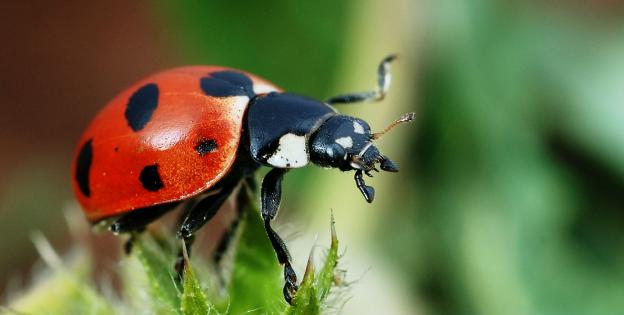- Nowadays, organic products from the food and beauty industries are highly fashionable; something logical if we take into account that human health and the protection of the planet are both in vogue.
- Organic cannabis growing is a natural and responsible way to grow healthy and delicious top-quality flowers.
- In this post we explain everything you need to know about how to keep your organic cannabis grows in good shape.

Organic ingredients
Here is a list of products of organic origin that are required for effective organic cannabis growing.
Organic fertilisers and additives:
- Worm castings: this is a 100% natural fertiliser that results from vermiculture, a decomposition process that transforms household organic food waste and organic animal waste into organic fertiliser. This is an oxygen-rich fertiliser ideal for the growth phase.
- Bat guano: bat excrement; a natural fertiliser extremely rich in phosphorus. Highly recommended for both the vegetative and the flowering phase.
- Seabird guano: a natural fertiliser made from seabird excrement. It has the same applications as bat guano and is also beneficial for both the growing and the flowering phase.

- Mealworm guano: mealworm castings have excellent insulating properties; they prevent evaporation and regulate substrate temperature, which in turn reduces water deficits and heat-related stress. It also provides beneficial elements to the soil, and is an interesting source of carbon that activates and maintains microbial life. It is very effective in both the vegetative and the blooming phase.
- Hydrolised kelp: a potent vitamin cocktail for plants. It is made of seaweed from the North American Pacific coast, from New Zealand, the Subantarctic, and even from China. It contains iron, iodine, trace elements, plant growth hormones (auxins and cytokinins), abscisic acid and ethylene, and 21% organic potassium. It encourages microbial life in the soil and chlorophyll production.
- Biochar: a soil fertiliser obtained from biomass pyrolysis. It improves soil water retention and stimulates the plant's immune defences against fungi and parasites. It significantly improves soil fertilisation.
-Black compost: this is a ready-to-use soil that contains horse compost; an enriching natural product that provides aeration and improves soil structure. It is highly beneficial for clay soils and acts as an excellent substrate for cannabis grown in pots.
Organic minerals:
- Perlite: a mineral product that is available in either granular or powder format; a silica sand of volcanic origin that is used industrially at temperatures up to 1200ºC. It has a neutral pH and a large capacity to retain water (4 or 5 times its weight).
- Vermiculite: a mineral product that is formed by the hydration of basaltic minerals associated to asbestos. Vermiculite exfoliates when heated, and this is the reason why it is usually commercialised in fragments. It improves aeration and enhances water retention in the soil.
- Volcanic basalt: a volcanic rock powder with balanced density that helps correct and improve soil aeration and structure. It is rich in silica and magnesium, and works efficiently against slugs.
- Epsom salt: a great source of magnesium sulphate. It generally strengthens the development of plants and positively influences photosynthesis.
- Zeolite: a microporous mineral rock that boosts soil oxygenation, provides nutrients, and cleans the soil.
- Azomite: an odourless mineral fertiliser that improves the germination of cannabis seeds, root development, plant production, and flower taste.
- Leonardine humic and fulvic acids: leonardine is a mineral rock with high concentrations of humic and fulvic acid, that enhances plant growth and root development, and significantly reinforces the plant immune system.
Compost tea ingredients
The following products can be used to prepare a good compost tea:
- Dry alfalfa: excellent for oxygenated compost tea applied in both the growing and flowering phase.
- Dry horsetail: rich in silica. It strengthens plant tissue and is ideal for compost tea used in the growth phase.
- Dry comfrey: rich in potassium, phosphorus, organic nitrogen (allantoin), and minerals. Its use is recommended during the flowering phase.
- Dandelion: a superb stimulator of soil life and plant growth. It encourages nutrient assimilation and its use is recommended throughout the flowering phase.

- Beer yeast: a probiotic (it contains live microorganisms that interact with other organisms) that effectively stimulates soil life, and promotes fermentation of oxygenated compost tea in both the vegetative and flowering phase.
- Bee pollen: very rich in nutrients (proteins, trace elements, vitamins, sugars, fats, hormones, etc.). It stimulates soil life and is used during both the growing and the flowering stage.
- Spirulina (powder format): a sea algae with a high content of phosphorus, potassium, trace elements, minerals, amino acids, vitamins, chlorophyll, and proteins. It stimulates bacterial life in the soil and works very well in oxygenated compost tea. It is the richest and most complete organic fertiliser that there is.
- Fish hydrolysate: a protein-rich powder made from cold water fish that contains 20 amino acids. It is highly valued as a nutrient and it also boosts the plants' natural defences. It can be added to irrigation water or used as a spray.
- Soluble bacteria: they contain more than 55 nutrients and activate microbial life in the soil. They stimulate root growth and overall plant balance, thus increasing productivity. This is a potent humus and compost activator, and an excellent bacteria base for compost tea.
- Black molasses (100% sugarcane): it has a dual role as it feeds and multiplies the microorganisms in the infusion. This infusion can be introduced via irrigation in both the growing and the flowering phase, delivering excellent results.
Organic growing method
(technique/source: Terralba/France) (suitable for 8 growing pots of 12-15 litres)
Solution to be applied between 10 and 20 days after germination:
- Add a handful of volcanic basalt to the bottom of each growing pot (geotextile pots are recommended as they help with soil aeration) and a handful of Zeolite to feed the roots.
- Prepare 1/5 of vermicompost, mealworm guano, and bat guano.
- Put this mix in a big bucket.
- Lay out 100 L of topsoil or Light Mix.
- Dig a hole in the centre and add the vermicompost and the guanos, as well as the basalt and zeolite.
- Mix homogeneously.
- Pour this Mix into the geotextile pot and plant your seeds.
- Add a top layer of alfalfa and some compost worms.
- At the start of the flowering period, spread out the remaining vermicompost, mealworm guano and bat guano over the topsoil.
- Don't forget to irrigate with molasses, hydrolised kelp, azomite, and humic and fulvic acids 2 to 3 times per month.
- You can optimise your grow by brewing oxygenated compost tea once or twice a week.
We would like to thank Xavier, Terralba's founder and CEO, for his generosity in sharing his professional knowledge with us.
Source: Terralba/France




Comments from our readers
Recipe states "Prepare 1/5 of vermicompost, mealworm guano, and bat guano", but it doesn't indicate a unit of measurement. 1/5 of what? A litre, a kilo, the mix ratio? I am confused.
Hi, 1/5 of the total amount of substrate required. Best regards
Did you like this post?
Your opinion about our seeds is very important to us and can help other users a lot (your email address won't be made public).